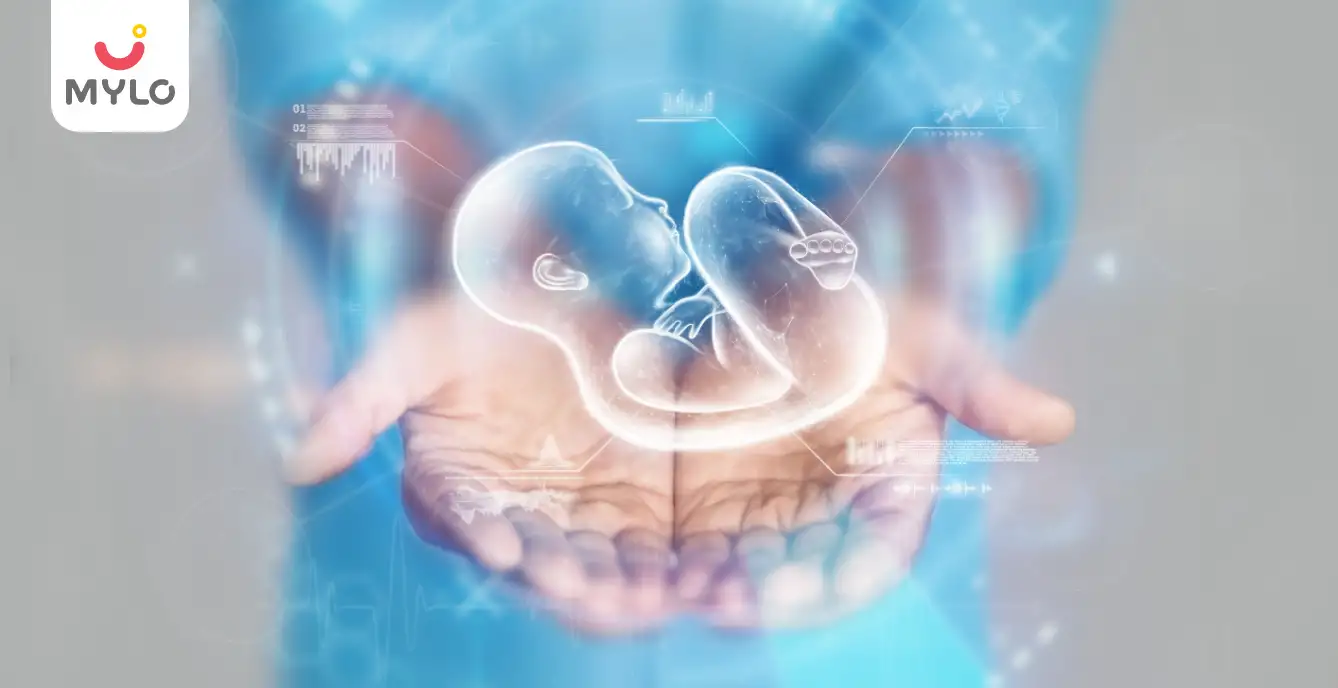
VIEW PRODUCTS
Article Continues below advertisement
- Home

- Developmental Disorders

- Understanding Down Syndrome: A Comprehensive Guide for Parents
In this Article
Developmental Disorders
Understanding Down Syndrome: A Comprehensive Guide for Parents
Updated on 12 July 2023
Article Continues below advertisement
Every year around 1.3 lakh babies are born with Down Syndrome in India. It is a lifelong condition that can cause both physical and intellectual disabilities. However, with proper care and support, children with Down Syndrome can lead happy, fulfilling lives. This guide provides an in-depth look into the causes, symptoms, diagnosis, and management of Down Syndrome. It also offers practical advice on how to care for a child with Down Syndrome, emphasizing the importance of education, resources, and support.
What is Down Syndrome?
Down syndrome is a genetic condition in which a baby has an extra copy of chromosome 21. It is also known as trisomy 21 and is not caused by anything a parent did or didn't do. This extra genetic material can cause developmental and intellectual delays, as well as physical differences such as a small stature, a flat facial profile, and a single crease across the center of the palm. While Down syndrome cannot be cured, early interventions and medical care can help children with the condition lead healthy and fulfilling lives.
What Causes Down Syndrome?
Down syndrome is a genetic condition that occurs when a baby has an extra copy of chromosome 21, resulting in a total of 47 chromosomes instead of the usual 46. This extra chromosome can cause physical, cognitive, and behavioral symptoms in babies with this condition. The exact cause of the extra chromosome is still unknown, but researchers believe it occurs randomly during cell division. There are screening and diagnostic tests available during pregnancy to detect Down syndrome, but neither can predict the full impact of the condition on a baby.
There are certain risk factors that can increase a baby's risk of Down Syndrome:
1. Maternal age
The most significant factor is the mother's age at the time of conception. Women who are 35 years or older when they become pregnant are more likely to have a pregnancy affected by Down Syndrome than women who become pregnant at a younger age. This is because the chances of chromosomal abnormalities increase as the mother's age advances.
Article continues below advertisment
2. Genetics
Down Syndrome is usually not inherited but rather caused by an error that occurs during cell division in the early stages of fetal development. However, being carriers of genetic translocation of Down Syndrome can increase parents' chance of passing Down Syndrome to their baby.
3. Having a child with Down Syndrome
Having a child with Down syndrome and having a translocation yourself can increase the likelihood of having another child with Down syndrome. To evaluate the chance of having a second child with Down syndrome, parents can seek guidance from a genetic counselor.
Symptoms of Down Syndrome
Each child with Down Syndrome is unique and may present a different set of signs and symptoms. Some children are healthy while some may have heart defects. That being said, children with Down Syndrome share some common features such as:
-
small head
-
flattened facial profile and nose
Article continues below advertisment
-
small ears
-
upward slanting eyes
-
protruding tongue
-
short neck with excess skin at the back of the neck
-
short height
Article continues below advertisment
-
decreased or poor muscle tone
-
a single deep crease across the center of the palm
Children with Down syndrome may also have cognitive development challenges, which can cause intellectual or developmental disabilities. While children with Down Syndrome may reach developmental milestones such as sitting up, crawling, and walking, they tend to do so later than other children.
Babies with Down syndrome are usually smaller than other newborns at birth and tend to grow at a slower rate, remaining shorter than average. As they grow, toddlers and older kids may experience delays in speech and self-care skills such as feeding, dressing themselves, and using the toilet.
Some behavioral symptoms may include stubbornness, difficulty paying attention, and obsessive or compulsive behaviors. Irrespective of their distinct features and developmental delays, children with Down Syndrome have many abilities and with support and encouragement, they can grow up to be highly skilled and talented.
Article continues below advertisment
What Complications Can Down Syndrome Cause?
Children with Down syndrome may experience a range of medical and developmental complications. Some of the common complications include:
1. Congenital Heart Defects
Approximately 50% of children with Down syndrome are born with congenital heart defects that may require surgery or medication.
2. Gastrointestinal Issues
Digestive problems such as constipation, reflux and celiac disease are more common in children with Down syndrome.
3. Respiratory Issues
Children with Down syndrome have narrower air passages, making them more susceptible to respiratory infections and sleep apnea.
4. Thyroid Disorders
Children with Down syndrome may have an increased risk of hypothyroidism, which is when the thyroid gland doesn't produce enough hormones.
Article continues below advertisment
5. Leukemia
Children with Down syndrome have a higher risk of developing leukemia, a type of blood cancer.
6. Vision and Hearing Issues
Children with Down syndrome may experience vision and hearing problems, such as cataracts, nearsightedness, and hearing loss.
7. Obesity
Studies have shown that individuals with Down Syndrome are more likely to experience overweight and obesity when compared to the general population.
8. Alzheimer's Disease
Individuals with Down syndrome are more likely to develop Alzheimer's disease at an earlier age.
9. Spinal Problems
Down syndrome can result in atlantoaxial instability (AAI), which is characterized by the misalignment of the top two vertebrae in the neck. This condition increases the possibility of spinal cord injury from overextension of the neck, posing a serious risk to individuals with Down syndrome.
Article continues below advertisment
It is important for children with Down syndrome to receive regular medical checkups and screenings to monitor and manage these potential complications.
How is Down Syndrome Diagnosed?
Down Syndrome can be diagnosed during pregnancy by performing prenatal screening tests or diagnostic tests. Prenatal screening tests can identify those at risk, while diagnostic tests can identify certain abnormalities but carry a small risk of miscarriage.
Screening tests for Down syndrome include:
-
Combined first-trimester screening
Article continues below advertisment
-
Integrated screening
-
Serum integrated screening
-
Cell-free DNA screening
Prenatal diagnostic tests for Down syndrome include:
Article continues below advertisment
-
Percutaneous umbilical blood sampling (PUBS)
How to Care for Your Child if They Have Down Syndrome?
Raising a child with Down Syndrome can be overwhelming and accompanied by a range of emotions such as loss, guilt, and fear of the unknown. However, connecting with other parents of children with Down Syndrome can help in coping with these concerns and finding ways to move forward. Moreover, many parents find that educating themselves about the condition can ease their fears and help them navigate the challenges that come with raising a child with Down Syndrome.
Here are some steps you can take to help raise your baby and improve their future outcomes:
Article continues below advertisment
1. Early intervention
Caring for a baby with Down syndrome requires special attention and care. Providing early intervention services such as physical therapy, speech and language therapy, and occupational therapy can help the baby achieve developmental milestones and prevent problems in the long term.
2. Educational options
Children with Down syndrome benefit from appropriate education provided in inclusive settings. Inclusive education enables children with Down syndrome to access the same learning opportunities as their non-disabled peers. Additionally, most babies and young children with Down syndrome can and do attend childcare centers, playgroups, and preschool settings alongside children of the same age.
3. Social and leisure activities
It's important to set aside time for family outings and explore social activities in your community, like sports teams, music classes, and park district programs. With a few adjustments, children with Down syndrome can participate and enjoy these leisure activities.
4. Encouraging independence
Although your child's abilities may differ from those of their peers, they can still learn important life skills with your guidance and consistent practice. Tasks such as packing lunch, managing personal hygiene and clothing, and completing simple cooking and laundry tasks can be mastered with time and effort. With your encouragement and support, your child can gain independence and feel a sense of accomplishment in their daily activities.
The Bottomline
In conclusion, caring for a child with Down Syndrome can be a challenging yet rewarding journey. As a parent, it is important to educate oneself on the condition and to seek out resources and support. With patience, love, and specialized care, children with Down Syndrome can thrive and achieve their full potential.
Article continues below advertisment
References
1. Antonarakis SE, Skotko BG, Rafii MS, Strydom A, Pape SE, Bianchi DW. (2020). Down syndrome. Nat Rev Dis Primers.
2. Asim A, Kumar A, Muthuswamy S, Jain S, Agarwal S. (2015)."Down syndrome: an insight of the disease". J Biomed Sci.



Written by
Mylo Editor
Official account of Mylo Editor
Read MoreGet baby's diet chart, and growth tips

Related Articles
ಬೇಬಿ ತೂಕ ಚಾರ್ಟ್: ಬೆಳವಣಿಗೆಯ ಮಾದರಿಗಳಿಗೆ ಭಾರತೀಯ ಪೋಷಕರ ಮಾರ್ಗದರ್ಶಿ | Baby Weight Chart: An Indian Parent's Guide to Growth Patterns in Kannada
ನಿಮ್ಮ ಮೊದಲ ತ್ರೈಮಾಸಿಕದಲ್ಲಿ ನಿಮ್ಮ ಜೀವ ಉಳಿಸುವ 14 ಸಲಹೆಗಳು | 14 Lifesavers For Your First Trimester in Kannada
What are the home remedies to get rid of mosquitoes in Hindi |मच्छर भगाने के घरेलू उपाय क्या हैं
Menstrual cup use in Hindi | मेंस्ट्रुअल कप क्या है और कैसे करें इसका उपयोग
Related Questions
Influenza and boostrix injection kisiko laga hai kya 8 month pregnancy me and q lagta hai ye plz reply me

Hai.... My last period was in feb 24. I tested in 40 th day morning 3:30 .. That is faint line .. I conculed mylo thz app also.... And I asked tha dr wait for 3 to 5 days ... Im also waiting ... Then I test today 4:15 test is sooooo faint ... And I feel in ma body no pregnancy symptoms. What can I do .

Baby kicks KB Marta hai Plz tell mi

PCOD kya hota hai

How to detect pcos

RECENTLY PUBLISHED ARTICLES
our most recent articles

Breast Milk
No Breast Milk After Delivery: What to Do & What are the Factors Responsible

Lactation Issues
Lactation Failure: A Comprehensive Guide to Understanding the Causes and Solutions

Breast Pain
Breast Pain During Pregnancy: What to Expect and How to Find Relief

Care for Baby
Baby Spit Up: The Ultimate Guide to Causes, Prevention, and Management

Infertility
Unexplained Infertility: Breaking Down the Factors and Finding Solutions

Ayurveda & Homeopathy
Mulethi: Unraveling the Therapeutic Potential of Licorice Root for Your Overall Health
- 5 Steps to a Healthy Lifestyle: The Blueprint for Your Wellness Journey
- Chandraprabha Vati: How This Potent Ayurvedic Formulation Can Boost Your Health
- Trichomoniasis: Meaning, Symptoms, Causes and Risks
- Gallstones in Pregnancy: Symptoms, Complications & Treatment
- Fertility Massage: A Holistic Approach to Boosting Fertility Your Chances of Conception
- Baby Vomiting After Feeding: Understanding the Causes and Solutions for Upset Stomach
- Why do you need to wear a high waisted panty during pregnancy?
- Top 5 Precautions You Should Take After Getting an IVF Treatment
- Baby Kicking During Pregnancy: Unveiling the Wonders of Quickening in Pregnancy
- Daddy duties: Here's your guide to fatherhood
- Four-weeks old baby: Health, growth, care and more
- Baby cloth diapers by Mylo
- When to begin toilet training your child
- Are you a first time dad & scared? Here's some help

At Mylo, we help young parents raise happy and healthy families with our innovative new-age solutions:
- Mylo Care: Effective and science-backed personal care and wellness solutions for a joyful you.
- Mylo Baby: Science-backed, gentle and effective personal care & hygiene range for your little one.
- Mylo Community: Trusted and empathetic community of 10mn+ parents and experts.
Product Categories
baby carrier | baby soap | baby wipes | baby shampoo | baby lotion | baby powder | baby body wash | stretch marks cream | stretch marks oil | baby cream | baby massage oil | baby hair oil |



